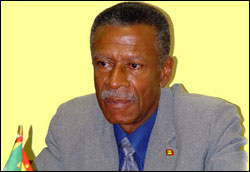Volume No. 2 Issue No. 46 - Monday July 14, 2008
New PM vows to tackle growing poverty
 By Peter Ischyrion By Peter Ischyrion


Tillman Thomas, 63, was jailed for two years in the early 1980s by the People's Revolutionary Government (PRG) of prime minister Maurice Bishop.
|
Prime Minister Dr. Keith Mitchell apparently got his numbers all wrong, and the former professor of mathematics at Howard University in the United States is joining a number of his political colleagues who have been brushed aside by the winds of change sweeping the Caribbean over the past 18 months.
Mitchell had hoped to create history in Grenada by becoming the first head of government to be re-elected to office for an unprecedented fourth consecutive term, but when the dust cleared after the Jul. 8 general election, it was attorney and human rights campaigner, Tillman Thomas, who emerged victorious.
Thomas, 63, who was jailed for two years in the early 1980s by the People's Revolutionary Government (PRG) of left-wing prime minister Maurice Bishop, credits the victory of his National Democratic Congress (NDC) to a "very effective campaign".
"We were well organised, we got our message over to the people and we have a very good programme for developing the country," Thomas told reporters soon after the preliminary results confirmed his victory.
He said the outgoing administration had shown a disregard for good governance and "people were not too happy as to how things were being managed in the country".
Grenada has one of the highest unemployment rates in the Caribbean, at about 15 percent. A third of all people are poor, and almost 13 percent are considered extremely poor, according to the International Fund for Agricultural Development (IFAD). Nearly half of all households are headed by women, in large part due to the migration abroad of men in search of jobs.
The NDC had been in opposition for the past 13 years after Mitchell led his New National Party (NNP) to government in 1995.
In the run-up to the election, the seventh since the island attained political independence from Britain in 1973, the NNP had urged voters to "Let the Progress Continue" and Mitchell said the defeat was "a very clear message that the people were voting for change".
"I think that's the fundamental factor here," said Mitchell, who had to ward off allegations of corruption, dictatorship and nepotism within his administration during the month-long campaign.
He said the anti-incumbent mood could also have been a result of the changing global environment that has affected all Caribbean countries, leading to an increase in the cost of living and the loss of preferential treatment for their goods and services on the world market.
The elections were monitored by observers from the Organisation of American States (OAS) and the Caribbean Community (Caricom). OAS Assistant Secretary General Albert Ramdin said the high turnout of voters underscored a willingness of the population to participate in the democratic process.
"In many of the polling stations that we went it was clear that almost 75 to 85 percent of the registered voters turned out. That is quite high for Caribbean elections in general," Ramdin said.
In the 2003 general election, the voter turnout was 57.4 percent.
Sections of the media here had billed the polls as the "most defining general election since our country secession from Great Britain in 1973".
"Defeat for either party could lead to the resignation of their leaders and usher them into the backdoor of the country's politics," the Grenada Advocate added.
The NDC had campaigned on the theme of "Restoring Integrity, Renewing Hope (and) Building Together" a country that would be a land of equal opportunity, tolerance, fair play and prosperity.
"This country needs new energy and new blood in its veins," said Thomas, adding that the election provided a "wakeup call to do something about the many perils our country is facing".
He listed a significant surge in the cost of living, increased levels of poverty, a growing unsustainable debt, high levels of unemployment, poor housing and lack of proper health care among the ills facing the country.
The country's agricultural sector, dominated by very small-scale farmers, has languished for years. In 1961, Grenada's farmers numbered 67,100. By 1995, the number had decreased to 43,400, IFAD says, a trend that continues as young people drift away from the farming sector. The end result has been a large proportion of uncultivated land, low productivity and the loss of traditional farming knowledge and techniques.
Food imports now account for more than one quarter of Grenada's total imports.
Thomas said that his new administration would significantly reduce import duties on a select basket of essential goods, and initiate programmes that would lead to increased food production and consumption.
The new government says its ability to attract new investments to the country will also be dependent on good governance, acknowledging that bad governance "is responsible for the failure of nation states" and is "often associated with corruption in high places".
Hence major donors and international financial institutions are increasingly basing their aid and loans on the condition that reforms, which ensure good governance, are undertaken, it added.
"One of the first tasks of our government will be to implement the Integrity in Public Life Act and the Anti-Corruption Act, both of which were passed by our Parliament several months ago, but now lie dormant," Thomas said.
He said that the new administration would also table freedom of information legislation.
"This is our country and we want to make it a place where we can live, work, bring up our children and enjoy the fruits of our labour in peace and harmony," Thomas added. (IPS)
 E-mail to a friend E-mail to a friend

|
|






